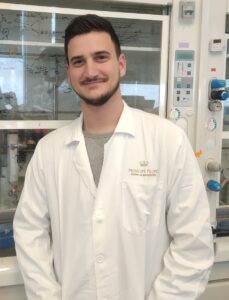PhD Students
Antoni Serrano Martí

Position: Ph.D. Student
Email: aserrano@cipf.es
Antoni Serrano Martí finished his degree in Biotechnology at the Polytechnic University of Valencia in July 2017. He is now a Ph.D. student in the program of Biochemistry and Biotechnology at the University of Valencia. During this period, he has performed research stays in other laboratories, including the laboratory of Prof. Dr. Matthias Gunzer at the Institute for Experimental Immunology and Imaging at the University of Duisburg-Essen (Germany) and the laboratory of Prof. Dr. Horacio Cabral at the University of Tokyo (Japan). These research stays have involved his Ph.D. project regarding identifying new biomarkers and developing combination polymer conjugates in metastatic prostate cancer. He has presented his work at national and international congresses, receiving an award at the Nanomedicine Meets the Tumor Microenvironment (NanoTME2023) conference.
Camilla Pegoraro

Position: Ph.D. Student
Email: cpegoraro@cipf.es
Camilla Pegoraro graduated in Pharmaceutical Chemistry and Technology (BSc and MSc) from the University of Padova (Italy) in December 2019 with her Master thesis project ("Exploring the impact of polymer size on the biological activity of PEG-haloperidol conjugates") taking place at the University of Reading (UK) with the Erasmus+ program. Her Ph.D. project forms part of the ITN-BIOMOLMACS, a European project funded by the European Union's Horizon 2020 research and innovation program (Marie Skłodowska-Curie grant agreement n° 859416). Her Ph.D. focuses on designing polypeptide-based systems capable of targeting mitochondria and delivering selected cargo under a specific trigger, such as reactive oxygen species, with relevant applications in mitochondrial dysfunction-related diseases, including cancer. During her Ph.D., Camilla completed two short stays within the ITN-BIOMOLMACS program. The first stay was at the Max-Plank Institute of Biochemistry in Petra Schwille's lab (Max Planck Institute of Biochemistry, Martinsried, Germany), where she undertook bio-nano interface studies in mitochondria membrane models. The second stay was at the University of Groningen in the laboratory of the Nobel-prize-winning researcher Ben Feringa, where she synthesized a polypeptide-drug-molecular motor conjugate for enhanced cytosolic delivery and mitochondria targeting. Camilla is also an active member of the Young Scientist Committee of the Spanish-Portuguese Local Chapter of the Controlled Release Society.
Maria Ibáñez Vives

Position: Ph.D. Student
Email: mibanez@cipf.es
Maria Ibáñez Vives completed her degree in Chemistry and then finished her Master's in Applied and Pharmacological Chemistry at the Jaume I University (UJI) of Castellon in 2019. During this time, she also studied medical chemistry, which involved an internship at the Hospital La Fe (Valencia) in the drug discovery group. From 2020 and 2021, she worked as an organic chemist in the Biosupramat group of the UJI, specializing in supramolecular chemistry. Finally, she received an FPI grant and joined the Polymer Therapeutics Lab at the CIPF for her Ph.D. to develop a polypeptide combination nanoconjugate for intranasal administration designed as a retroactive therapy for Alzheimer's disease. In this project, Maria introduced two innovations - synthesizing nanocarriers with inherent activity using taurine and the implementation of microfluidics.
Amina Benaicha Fernández

Position: Ph.D. Student
Email: abenaicha@cipf.es
Amina Benaicha Fernández graduated in Pharmacy from the Universitat de València in 2020. Next, she carried out her Master's degree in Biochemical Biotechnology at the Universitat Politècnica de València from 2020-2022. She developed her Master's thesis project, "Polyglutamate nanoconjugates for the treatment of pediatric solid tumors," in the Polymer Therapeutics lab at the CIPF. In 2022, she received an AECC grant to stay in the CIPF as a Ph.D. student to develop a theranostic nanoplatform for treating and diagnosing glioblastoma multiforme. This project uses polymer-drug conjugates with inherent imaging abilities, which provide our conjugates with the ability to diagnose, monitor disease progression, and treat patients.
Karolina Gwizdała

Position: Ph.D. Student
Email: kgwizdala@cipf.es
Karolina Gwizdała graduated from the Gdańsk University of Technology (Poland) with a Bachelor's degree in Chemistry in 2020. She then obtained a Master's degree in Green Technology and Chemical Technology, specializing in the Technology of Polymer, Cosmetics, and Functional Materials at the same university from 2020-2023. Her Master's thesis focused on obtaining an anatomical nasal septum implant through 3D printing, modifying the implant with active substances, and evaluating biodegradability. Her Ph.D. project forms part of the ITN MSCA Multismart, a European project funded by the European Union's Horizon 2021 research and innovation program (Marie Skłodowska-Curie grant agreement n°101072585). Her Ph.D. project focuses on designing star-shaped tripeptides with fibrillar organization combined with stem cell therapy to treat spinal cord injury.
Margarita Gubina
Position: Ph.D. Student
Email: mgubina@cipf.es
Margarita Gubina graduated from the Moscow Institute of Physics and Technology with a Bachelor's degree in Applied Mathematics and Physics in 2019. She then obtained her Master's degree from the same institution in 2021. Her Master's thesis, titled "Mapping of lipid and protein components in biological cells and tissues by mass spectrometry," focused on developing new sample preparation protocols and techniques for studying and 3D chemical mapping of biological cells using time-of-flight secondary ion mass spectrometry, while preserving the maximum amount of structural and chemical information. The primary focus of her research was investigating changes in the lipid profile and microviscosity of cancer cell membranes during treatment. Currently, her Ph.D. project at the CIPF centers on characterizing and separating cellular vesicles based on their cell of origin, as part of the Cell2Spine project aimed at studying the treatment of spinal cord injuries using precision nanomedicine.
